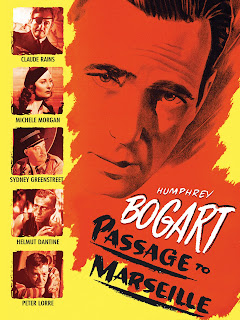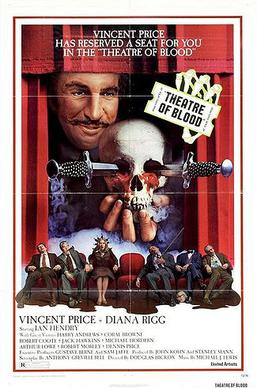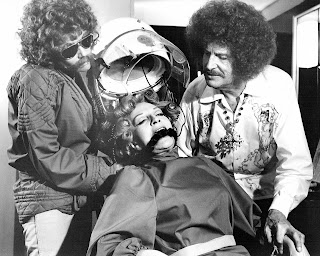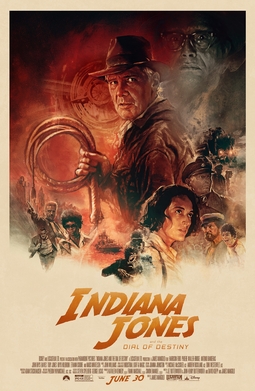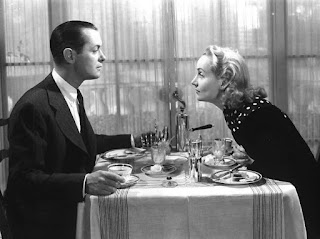INDIANA JONES AND
THE DIAL OF DESTINY
I am not so enamored of Indiana Jones that I have a fierce attachment to the character. My first encounter with Indy is when my Mom took me to see Indiana Jones and the Temple of Doom in theaters. My memories of this are extremely vague, but apparently, I ran out of the theater screaming at one particular point. I'll let you guess at exactly what point in the movie had me flee in terror. I might have done better to have repeated this after watching Indiana Jones and the Dial of Destiny. Simultaneously trying to recapture the pasts and move forward into the future, Dial of Destiny is more like an unwilling zombie forced out of its tomb when it would rather just stay buried.
Nazi Germany, 1944. As World War II is coming to a fiery close, Dr. Indiana Jones (Harrison Ford), aided by British archaeologist Basil Shaw (Toby Jones) is deep in German territory looking to take the fabled Spear of Destiny from the Nazis. While the Spear of Destiny is a fake, Nazi fellow traveler Dr. Jurgen Voller (Mads Mikkelsen) tells the Nazis that another object they posses is genuine. It is the Antikythera: the Dial of Destiny created by Archimedes. Jones and Shaw manage to eventually outwit the Nazis and dump part of the Dial of Destiny.
New York, 1969. Dr. Jones is now alone, depressed and on the verge of total collapse. His wife Marion has left him, his son Mutt has been killed in Vietnam, and he is about to formally retire from teaching college. Enter Helena Shaw (Phoebe Waller-Bridge), Basil's daughter and Jones' goddaughter. Claiming to want to merely investigate the Dial of Destiny, we learn that she is really an antiquities smuggler and steals the half that Jones kept at the college to sell on the black market.
It is now a chase to get this piece, as Voller now works for NASA, is also on the quest to retrieve it. He believes putting together the Dial of Destiny will allow him to go back to Nazi Germany to correct Hitler's mistakes and win the war. It then becomes a wild hunt through Tangiers, the Aegean Sea and Greece to locate the other half of the Dial. Once obtained, our heroes and heroines face death and time travel before their adventure ends.
Truth be told, I think I skipped a lot of plot in Dial of Destiny because Dial of Destiny has a lot of plot. Far too much in this two-and-a-half-hour plus film. The Tangiers chase scene, for example, introduces an Indian tycoon who got screwed over by Helena (in more ways than one). Who was he? Why was he there? Why was he never brought up again? After he failed to capture her in Tangiers, he evidentially just gave up looking for her.
What was the point of all that? Was it to set up some Helena spinoff that audiences will most likely never see, let alone care about? Same with Helena's sidekick Teddy Kumar (Ethann Isidore). He is just there to serve as Helena's aide, but does his existence show a tender, dare I say, motherly side to her? More and more, Dial of Destiny did not know what it wanted us to think of Helena. Is she an adventuress, living off her wits? Is she a shameless hussy, sleeping her way through the world to get what she wants? Is she a daughter seeking to redeem her father's memory?
She can't be all of the above. If Dial of Destiny had settled on one trait for Helena, we would have had a better film. Her character could have been Indy's eager but naïve protégé. She could have been a bright but inexperienced student caught up in the adventure who can fill in information for and to Indy. She could have been the daughter seeking her father's redemption. Alas, because we are in the "Girl Boss/Slay Queen" Era, we have to have a female character who overpowers the male lead at every turn. She even manages to have a punch strong enough to knock Indy out for apparently days.
Reducing this to a battle between an "aging graverobber" (which is how I think Helena refers to her godfather) and a "international woman of mystery" (as Helena clearly sees herself) does not build up her character.
Come to think of it, the character of Teddy, Helena's Boy Friday, could also have been cut. This effort to give Helena her version of Short Round failed for a variety of reasons. I think the primary reason is that Teddy seemed far too contemporary for the film. Granted, the film takes place in 1969, but somehow both Isidore's performance and Teddy the character felt like they were from 2023. Teddy openly saying that he thought Indiana Jones knew the Wright Brothers personally felt less like he was a naïve kid and more like a mean-spirited one.
So much bloat dooms
Dial of Destiny. John Rhys-Davies is pointless as Sallah, a way to needlessly insert him into things. Why have him in New York as a taxi driver when he would have fit in better as his man in Tangiers? The entire sequence where Indy, Helena and Teddy visit his until now unknown friend Renato (Antonio Banderas) could also have been cut entirely. As a side note, at the
Dial of Destiny screening I attended, the audience burst out into laughter when Banderas came on the screen. Read into that whatever you like.
Dial of Destiny has four credited screenwriters, including director James Mangold. It is impossible for me to believe that there were not more people attempting to put things into the film. Even if there were only four writers, how any of them failed to avoid a great cinematic sin is beyond me. That sin is telling and then showing. Early in the film, Jones tells us how Basil was driven bonkers by his obsession with the Dial of Destiny. About an hour into the film, when Jones and Helena are flying to Tangiers, we get a flashback where we see exactly what we were told. Why, oh why did the filmmakers opt to tell and later show?
A lot of Dial of Destiny makes no sense. Jones does not recognize Helena until she mentions Basil, then he starts calling her "Wombat". Indiana Jones is shot and appears close to death, but once he's up in the air about to fly back in time, he has the strength to fight Nazis, save Helena from falling out of a plane before jumping out with her himself. Once he's back on the ground, I guess he remembered he had been shot and was bleeding profusely, so he's dying again.
As another side note, I was unaware that the CIA was not only hiring black female agents in 1969, but giving them prominent assignments. I support representation in film, but not to where it veers close to historical inaccuracy. When Agent Mason (Shaunette Renée Wilson) is killed, it's a sign of the film's misguided nature that it thinks we will care.
Curiously, an element that has been highly criticized is one of the film's few saving graces. As I watched the pre-title sequence (which to be fair ran longer than I think it should), I thought it was the bright spot in the film. The de-aging of Ford was not perfect, but it was better than I thought it would be. Moreover, I thought how this section would have made for a good short film, closer to the Indiana Jones Chronicles series. If Dial of Destiny had been just the World War II section, we could have had a good short film.
Even if they had opted to cast a younger actor as the young Dr. Jones, we could have had a good film. Instead, the filmmakers had to kowtow to fans who would accept no one other than Ford. Yet the same fan base apparently would embrace the empowered Helena?
Ford looks bored throughout all of this, as if he wants us to know his heart is not in this. Waller-Bridge is unsettled in her role, but she is not a charming rogue or femme fatale or plucky sidekick. Instead, she's an obnoxious, smug, almost sadistic know-it-all who belittles Jones at every opportunity. Even when she is shown to be wrong, like when Jones is able to fix the tuk-tuk, she does not want to admit she could be wrong.
Mads Mikkelsen doesn't go far as the Nazi Voller/Schmidt (his new name when working with NASA). He probably is the best of the cast, but that's an awful low bar to cross.
For a film that cost a purported $300 million (though I suspect it was more expensive), it has shockingly bad visual effects. The chase through Tangiers in particular is terribly fake-looking.
If not for a surprisingly good opening section, Indiana Jones and the Dial of Destiny would be a bigger disaster than it already is. There is no reason to have made Indiana Jones and the Dial of Destiny. Fortunately, neither Harrison Ford nor Phoebe Waller-Bridge will get the chance to demolish Indy's already wrecked legacy.
Pity those involved in Indiana Jones and the Dial of Destiny cannot use said dial to turn back time and have us forget the horror that was this film.
DECISION: C-


